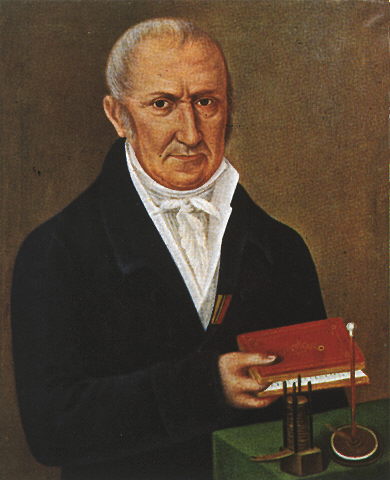Alessandro Volta
 Count Alessandro Volta -- Super
Scientist Biography Count Alessandro Volta -- Super
Scientist Biography
Count Alessandro Volta (1745 -
1827). Born in Como, Italy, into a noble family,
Count Volta was a physicist and pioneer in the
study of electricity. "Volt," named
after Count Volta, is a unit of electric
potential and electromotive force. Count Volta
also made discoveries in electrostatics,
meteorology and pneumatics.
http://www.energy.ca.gov/education/scientists/volta.html
Volta, Alessandro, Count
Volta, Alessandro, Count (1745-1827),
Italian physicist, known for his pioneering work
in electricity. Volta was born in Como and
educated in the public schools there. In 1774 he
became professor of physics at the Royal School
in Como, and in the following year he devised the
electrophorus, an instrument that produced
charges of static electricity. By 1800 he had
developed the so-called voltaic pile, a
forerunner of the electric battery, which
produced a steady stream of electricity. In honor
of his work in the field of electricity, Napoleon
made him a count in 1801. The electrical unit
known as the volt was named in his honor.
http://www.ideafinder.com/facts/inventors/volta.htm
Volta
Willie Weinberg
A pioneer in Electrochemistry. Volta
became fascinated with the phenomenon of the age,
electricity. The major feat of his life involved
not static electricity, but dynamic electricity-
the electric current. Following the experiments
of Galvani, who was a friend of his and sent
copies of his papers on the subject, Volta
attacked the question of whether the electric
current resulting when muscle was in contact with
two different metals arose from the tissue or
from the metals. In 1800 Volta virtually clinched
the victory by constructing a device that would
produce a large flow of electricity. Volta's
device was an "electric battery"- the
first in history. The invention of the battery
lifted Volta's fame to its pinnacle. The unit of
electromotive force- the driving force that moves
the electric current- is now called the
"volt."
http://www.italian-american.com/volta.htm
Alessandro Giuseppe Anastasio Volta
Volta's first important invention
was the electrophorus (1775), a device
capable of passing an electric charge to
another object. His most important discovery,
though, followed the experiments of Luigi Galvani on animal
electricity: Volta's "voltaic pile" (1800) provided
proof that electricity could be conducted through
and produced by non-organic matter. In the
following year, he was created count by Napoleon.
http://www.english.upenn.edu/~jlynch/FrankDemo/People/volta.html
Alessandro Volta
Linksammlung zu Alessandro Volta.
http://www.jteln.de/privat/p_niester/p_natwis/alessandro_volta/
Alessandro Volta
On the 20th of March 1800, came one
of the greatest breakthroughs in the electricity
experiments. A professional disagreement, over
the results of an experiment, between Luigi Galvani and
Alessandro Volta, two leading scientists, led
Volta to prove that when certain metals and
chemicals come into contact with each other they
can produce an electrical current. He placed
together several pairs of silver and zinc discs
separated by paper soaked in salt water and an
electrical current was produced. Volta had
produced the first battery..
http://www.the-education-site.com/volta.html
Catholic Encyclopedia: ALESSANDRO VOLTA
Physicist, b. at Como, 18 Feb.,
1745; d. there, 5 March, 1827. In 1769 Volta
published his first paper, "De vi attractiva
ignis electrici", which attracted attention
and helped to secure for him his first public
appointment, professor of physics in the Liceo of
Como (1774), a position which he held until 1779,
when he was elected to the chair of natural
philosophy in the University of Pavia. The
twitching of frog's legs under electrical
stimulus, discovered by Swammerdam in 1658 and
re-discovered and described by Galvani in 1786,
occasioned a memorable controversy as to the
cause of the convulsive movements; after years of
discussion the "animal electricity" of
Galvani was superseded by the "contact
theory" of Volta. In seeking further
experimental evidence in favour of his contact
theory, Volta was led to the greatest of his
inventions, the voltaic "pile", which
he described in a communication of 20 March,
1800, to Sir Joseph Banks, President of the Royal
Society of London. Consisting as it did of a
number of discs of zinc and copper separated by
pieces of wet cloth and arranged in a vertical
column; a more efficient arrangement was, however
soon found by Volta in the "crown of
cups". The voltaic battery of 1800 marks an
epoch in physical theory as well as in the
application of science to the welfare of mankind.
http://www.newadvent.org/cathen/15503a.htm
Count Alessandro Volta - by RjC
Richard Cheng
In 1780, Volta's friend, Luigi
Galvani discovered that contact of two different
metals to a frog muscle results in an electric
current. Volta began experimenting with metals in
1794 and discovered animal tissue was not needed
to produce a current. This discovery led to many
conflicts with animal-electricity adherents and
the metallic-electricity advocates. However, when
Volta created the first electric battery, he
proved to have won. One year later, Alessandro
Volta demonstrated his battery's generation of
electric current to Napoleon in Paris and he was
made into a count and a senator of the kingdom of
Lombardy. The emperor of Austria made him
director of the phylosophical faculty at the
University of Padua in 1815, 12 years before the
day he was to die.
- Full
Report
Richard Cheng, Edwin
Li, Edwin Liang, and Scott Walter
The world's first
battery -- the voltaic pile -- was one of
the most significant inventions that
emerged during the Scientific Revolution.
In the world of science, the most
significant of all the forces is that of
electricity. Science, in general, has
enabled the human race to better
understand how these things that make up
our world exist, move and change; but it
is the discovery and application of
electricity that has become the single
most influential contrivance of the
twentieth century.
Alessandro
Volta was born on Febuary the 18th, 1745 in Como,
Lombardy and died, 82 years after on March the
5th, 1827, also in Como, Lombardy.
http://www.geocities.com/CollegePark/Classroom/8835/
Volta, Alessandro (1745-1827)
Italian physicist who constructed a
device for accumulating a large charge by a
series of inductions and groundings.
http://www.treasure-troves.com/bios/Volta.html
|



